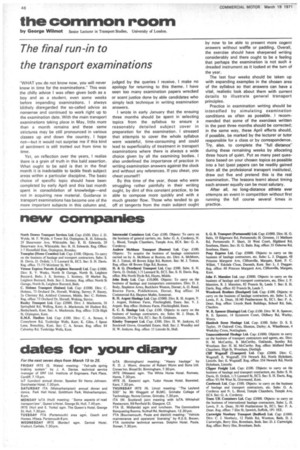The final run-in to the transport examinations
Page 48

If you've noticed an error in this article please click here to report it so we can fix it.
'WHAT you do not know now, you will never know in time for the examinations." This was the chilly advice I was often given both as a boy and as a student, even some weeks before impending examinations. I always blithely disregarded the so-called advice as nonsense and continued to work right up to the examination date. With the main transport examinations taking place in May, little more than a month remains and these same strictures may be still pronounced in various classes up and down the country. I hope not-but it would not surprise me if this kind of sentiment is still trotted out from time to time.
Yet, on reflection over the years, I realize there is a grain of truth in this bald assertion. What ought to be said is that in the final month it is inadvisable to tackle fresh subject areas within a particular discipline. The basic choice of specific topic should have been completed by early April and this last month spent in consolidation of knowledge-and not in acquiring new material. Guidance in transport examinations has become one of the more important subjects in this column and, judged by the queries I receive. I make no apology for returning to this theme. I have seen too many examination papers wrecked or scant justice done by able candidates who simply lack technique in writing examination answers.
I wrote in early January that the ensuing three months should be spent in 'selecting topics from the syllabus to ensure a reasonably detailed subject cover in preparation for the examination. I stressed that attempts to cover the whole syllabus were wasteful, time-consuming and could lead to superficiality of treatment in transport examinations where there is always a wide choice given by all the examining bodies. I also underlined the importance of practice in writing examination answers against the clock and without any references. If you cheat, you cheat yourself!
By this time of the year, those who were struggling rather painfully in their writing ought, by dint of this constant practice, to be able to compose more quickly and with a much greater flow. Those who tended to go off at tangents from the main subject ought by now to be able to present more cogent answers without waffle or padding. Overall, the exercise should have sharpened writing considerably and there ought to be a feeling that perhaps the examination is not such a dreaded instrument as it looked at the turn of the year.
The last four weeks should be taken up with expanding examples in the chosen area of the syllabus so that answers can have a vital, realistic look about them with current details to illustrate general transport principles.
Practice in examination writing should be intensified by simulating examination conditions as often as possible. I recommended that some of the exercises written in the past three months should be corrected; in the same way, these April efforts should, if possible, be marked by the lecturer or tutor responsible for a class or by correspondence. Try, also, to complete the "full distance" during these remaining weeks by allocating three hours of quiet. Put as many past questions based on your chosen topics as possible into a hat (past papers can be readily gained from all the professional transport institutes), draw out five and pretend this is the real examination. The lessons learnt about timing each answer equally can be most salutary.
After all, no long-distance athlete ever attempts an event in competition without first running the full course several times in pre Cti ce




























































































